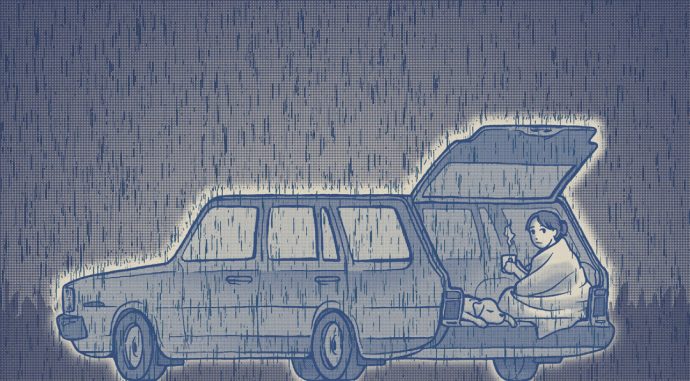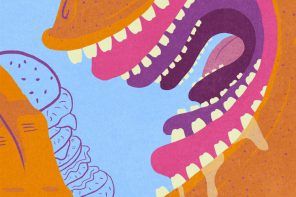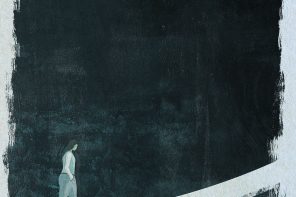When my father talks about his years of drifting in and out of homelessness, he is quick to remind me of how lucky he was to have always had a car. The first car I remember him owning was a blue Toyota station wagon, and I remember it only by these most basic of details, the details a child would remember: color, make, general style. Even now, I couldn’t tell you the model. I’m not even sure if when I was young I realized that cars had models, likely thinking that they simply fell into one of two categories: sedan or station wagon. The same way that for years I thought that cats were either just regular or Siamese.
To this day, perhaps because of my father, I think of station wagons—and most larger vehicles, really—as a being reasonable places to sleep. I’ve slept in the backs of plenty of them over the years, on bungled camping trips and long cross-country drives, with friends and boyfriends and dogs. It’s cozy to sleep in the back of a car, particularly when it rains, and dreams arrive enfolded in the relentless tattoo of drops on metal. But, of course, it’s easy for me to characterize sleeping in cars as cozy because it’s something I’ve only ever done by choice.
In my family, we never used the word homeless to describe my father’s decade-long predicament, maybe because it was punctuated by stays in houses—sometimes ours—and apartments and office store-rooms and the Y and likely worse places that he’s never had the heart to tell me about. And so, instead of using the word homeless, I grew up hearing those years referred to as when he lived in his car, or more euphemistically, when he was on the road.
My father’s blue Toyota station wagon had a certain smell that he’s managed to maintain in each of his subsequent vehicles. It’s a smell of carelessness: of windows left open in the rain and banana peels moldering on a floor mat. It’s the smell of peach pits and seashells that roll back and forth on the dashboard, of running shoes tucked under the seat, and an old knitted cap ripe with the funk of a man’s unwashed head.
For a while when I was young, my father kept a phone perched in the gap between the two front seats of his car, an old black rotary phone, the kind that technically were leased from the phone company, though nobody ever gave one back. We joked that it was his car phone; this, during a time when there was such a thing as a car phone, though they were usually only owned by the very rich and/or criminal. As we drove around, my father would pretend to make important business calls, faking conversations for my sister’s and my amusement, conversations that I never thought of as being anything more than wholly imagined. I’d never known my father as the businessman he’d been when he and my mother had first met, back when he was wealthy and functional and married to someone else.
Even during the periods when my father had a place to stay, he was able to fit most of his belongings into a series of cardboard boxes that could be easily stowed in the back of his car when a getaway became necessary. Sometimes these getaways were externally motivated, by landlords demanding rent he couldn’t pay, or friends needing their guest quarters back. Sometimes, though, my father’s getaways were motivated by something nagging and ineffable inside his head, something telling him that, once again, it was simply time to go. And then he’d pack the cardboard boxes into the blue Toyota and drive across the country to Esalen, a spiritual retreat center on the Northern California coast, arriving with a sunburnt left arm and a sense of hope that this time he’d get it all figured out. At Esalen, he’d tend the organic vegetable garden or wash dishes in the communal kitchen in exchange for room and board. He’d attend small workshops with Joseph Campbell and other such luminaries, sit naked in the cliffside hot tubs and gaze at the Pacific with the wealthy Bay Area housewives and fellow lost pilgrims. And after a few weeks or months, he’d always drive back east.
Instead of using the word homeless, I grew up hearing those years referred to as when he lived in his car, or more euphemistically, when he was on the road.
I don’t know for exactly how many years of my childhood my father lived in his car. I don’t know how many times he drove out to California, or how long he stayed. I know that once, he stayed long enough to rent an apartment with a girl almost half his age, someone he met at Esalen. Possibly in the hot tubs. Though he looks back on this relationship with something close to embarrassment, it is one of the episodes of his peripatetic life that I am, in fact, unequivocally grateful for. This woman has become one of my best friends, and though she and my father haven’t spoken since their breakup almost twenty years ago, she and I remain close. I find myself conceiving of my father’s relationship with her as his having delivered her to me. Which sounds awfully strange and New Age-y, but it’s the only real way that I can frame it. It’s as though he were saying: Here, have this person who shares our worldview and our sense of humor and outrage and wonder, because I’m not always going to be around.
During the periods when my father was stable enough—financially and otherwise—to rent an apartment or quirky little cottage in the woods (always within an hour of the house where my sister and I lived), it would never contain the stock inventory of a divorced father’s home: no corner cache of weekend toys, children’s books, board games. Not even a deck of cards. But there were always other things to entertain us, like a box of scrap paper with printing on one side, reams of which he’d pick up for free from a local copy shop. The paper was white or pale pink or sometimes goldenrod. It came from mistaken copy jobs or jobs never picked up, advertising things like sidewalk sales and lost dogs. My sister and I drew on this copy paper with the dark-blue felt-tip pens our father favored for his own writing, pens that I occasionally come across even now, and that I will forever think of as the pens my father likes. It has to do with his being left-handed, and how the ink from these pens soaks into the paper quickly enough not to smudge. Both of my parents are left-handed, something neither my sister nor I inherited, this alien trait that always seemed like further proof of our parents having been meant for one another, even though they could never quite get it together. My mother even had a special pair of left-handed scissors that I could never make work. I doubt my father has ever owned proper left-handed scissors; likely he just struggled with the right-handed version for so many years that he simply accepts scissors as being a difficult tool to manage, like so many things that are hard for him, but that other people manage to move through with little effort.
When my sister and I would visit him, after the copy paper had exhausted our imaginations, we would begin the ritual scouring of our father’s bookshelf for a particular book that we knew was somewhere to be found, in spite of whatever halfhearted attempt he may have made to hide it after our last visit. This book was the Holy Grail, a guaranteed laugh riot, a chance to tease our father who would feign embarrassment and irritation before wresting it from our grasp and reshelving it.
The object of our obsession was called World Guide to Nude Beaches and Recreation, a photo-heavy paperback full of nudists disporting seaside in hairy 1970s glory. It wasn’t the images of nudity in the book that shocked and amazed us, but rather the simple fact of our father owning it, so out of place was it among the rest of his titles. We figured it had something to do with Esalen and the naked hot tubs, which he’d told us about, much to our squeamish delight. To be naked around one’s family was one thing; perfect strangers, another entirely.
When asked about it now, my father tells me that he doesn’t remember how or when he came into possession of World Guide to Nude Beaches and Recreation, though it’s still on his shelf, tucked between The Eisenhower Diaries and Winston Churchill’s A History of the English Speaking People, books that have been packed and unpacked, stored, shipped and shelved likely more times than he could ever remember.
Another of the volumes in my father’s small library was a big, old Webster’s dictionary. Several years ago, he was looking up a word and came across a small folded piece of paper. It was pink, and cut in the uncertain geometry of a child’s scissoring. He smiled, he later wrote to me, as he pulled it from between the onionskin pages of the book, warmed by thoughts of my sister and me as little girls, tucking tokens of our affection into his belongings so that he might find them later on, long after we’d been dropped back off at our mother’s and he found himself alone in his rooms, wondering if maybe it was once more time to pack up and get back on the road.
From his now-stable lodgings in a slightly shabby ranch house on a quiet road in upstate New York, he unfolded the paper. Dear Dad, read the note in the rounded letters of a little girl’s handwriting, Fuck You.
Though a therapist might derive great meaning from this sentiment—suppressed rage at his having left us, an inability to communicate openly about painful family issues, etc.—I’m fairly confident that this note simply represented what my sister and I found to be the highest form of humor at that age: bad language. And bad language was something that my father wasn’t all that concerned about, understanding as he did that there were far worse things in life than a handful of words that couldn’t be said on TV.
Emily H. Freeman is a writer and teacher living in Missoula, MT. She earned her MFA in Creative Writing from the University of Minnesota, and has taught writing at various schools, universities, and nonprofits in NY, MN, and MT. Her work has appeared in the Best New American Voices anthology, The Morning News, the Minneapolis-St. Paul Star Tribune, and elsewhere.




